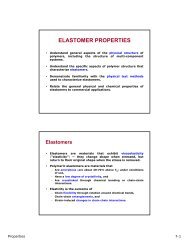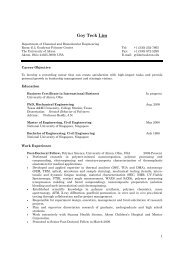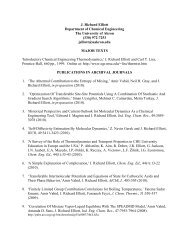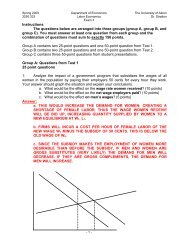Sociology of the Anarchists - Gozips.uakron.edu - The University of ...
Sociology of the Anarchists - Gozips.uakron.edu - The University of ...
Sociology of the Anarchists - Gozips.uakron.edu - The University of ...
Create successful ePaper yourself
Turn your PDF publications into a flip-book with our unique Google optimized e-Paper software.
and social interactions within it... no one approaches it with a blank slate or no<br />
experience. On <strong>the</strong> o<strong>the</strong>r hand, I imagine that <strong>the</strong>re may be suitable resistance to many<br />
conclusions within sociology, due to preexisting biases that people have (“class doesn't<br />
exist”, “poor people are just lazy”, “women aren't oppressed anymore”, etc.). I am<br />
looking forward to teaching to see how people respond and react with <strong>the</strong>ir prior<br />
knowledge.<br />
Values <strong>of</strong> teaching:<br />
I cannot say I was vastly shocked by Roberts' (1986) piece on <strong>the</strong> development <strong>of</strong><br />
intellectual development, where he notes that large numbers <strong>of</strong> college students and o<strong>the</strong>r<br />
adults never gain full operational thinking ability. I did appreciate his examples <strong>of</strong> how<br />
<strong>the</strong> teacher-student relationship can go awry when this is not considered, however.<br />
Primarily, I liked his focus upon <strong>the</strong> structuralist <strong>the</strong>ory <strong>of</strong> teacher:<br />
If we view our role as one <strong>of</strong> simply transmitting<br />
knowledge, we conform to <strong>the</strong> expectations <strong>of</strong> our dualistic<br />
students by playing <strong>the</strong> role <strong>of</strong> 'Authority'. Playing this role<br />
may <strong>the</strong>n serve as a barrier to <strong>the</strong> development <strong>of</strong><br />
independent thinking, for dualistic students assimilate that<br />
role into <strong>the</strong>ir own cognitive structure and fail to think for<br />
<strong>the</strong>mselves. (p. 214)<br />
My own favorite classes (in retrospect, at least) were those that provoked me to think and<br />
challenge my own beliefs. When “knowledge” was handed to me on a platter I was far<br />
less likely to retain it long-term. Thus, even when I rejected <strong>the</strong> leanings or style <strong>of</strong> <strong>the</strong>se<br />
more challenging instructors, I still appreciate what <strong>the</strong>y did for/to me (intentionally or<br />
inadvertently): causing me to think for myself. “Cognitive Dissonance” is not only a great<br />
idea for a band name, but is a pretty damn cool thing, too.<br />
In this same light, O'Brien and Kollock (1991) call for us (as teachers) to “empower our<br />
students by demonstrating <strong>the</strong> relevance <strong>of</strong> <strong>the</strong> sociological perspective to everyday<br />
modern life” (p. 140). I cannot think <strong>of</strong> a more on-point statement than that, in regards to<br />
making <strong>edu</strong>cation “stick”. Probably <strong>the</strong> only reason I continue in academics is that I can<br />
still find a way to make it relevant to understanding everyday life. <strong>The</strong> day I get stuck in<br />
some abstract, arcane, and o<strong>the</strong>rwise silly irrelevancy <strong>of</strong> “knowledge pursuit”, is <strong>the</strong> day I<br />
need to get out. Even for students who only take “Introduction to <strong>Sociology</strong>” as a general<br />
<strong>edu</strong>cation requirement, making <strong>the</strong> ideas/concepts relevant to <strong>the</strong>m seems like a great way<br />
to engage <strong>the</strong>m and possibly interest <strong>the</strong>m outside <strong>of</strong> <strong>the</strong>ir gen-ed needs.<br />
I liked <strong>the</strong> application <strong>of</strong> social exchange <strong>the</strong>ory (SET) to teaching, and although a bit<br />
tedious, I thought <strong>the</strong> discussion drove home <strong>the</strong> authors' point ra<strong>the</strong>r well—allowing<br />
students to construct for <strong>the</strong>mselves just how sociology (or social psychology) is relevant<br />
to <strong>the</strong>m, at <strong>the</strong> most immediate level (such as intimate relationships). SET is a decent way<br />
<strong>of</strong> bridging this personal experience with more formal knowledge.<br />
Best, however, was how <strong>the</strong>y tackled <strong>the</strong> subject <strong>of</strong> “values” in <strong>the</strong> classroom. It reaffirms<br />
[ Williams 96 ] [ this is a draft. do not cite. ]






